The electrical contracting business has changed tremendously due to advancements in technology, and therefore, specialized software solutions have become an important part of contemporary businesses. Electrical Contractor Software has turned out to be a pillar of companies that aim at having simplified operations, managing their projects successfully, and staying ahead of the competition.
These complete digital software systems are assisting the electrical contractors in managing the projects in terms of estimation and scheduling, along with customer relations, as well as financial monitoring.
Through an effective software program, the electrical contractor can cut down on administrative tasks, achieve greater precision in the delivery of service, customer complete satisfaction, and eventually, increased profitability. This guide addresses the best software that any electrical contractor needs to find himself or herself to make the right decisions concerning their business.
What is Electrical Contractor Software?
The Electrical Contractor Software is an IT system that is specialized in that it is created to handle the affairs of electrical contracting firms. The software solutions come together to unify various business functions such as project management, scheduling, invoicing, customer relationship management, inventory tracking, and financial reporting software together. These are different from generic business software, particularly in understanding the electrical contracting process and providing features that let you do things like electrical estimating, permitting, safety compliance tracking, and electrical-specific reporting.
Today, Electrical Contractor Software is often provided as a cloud-based solution, where contractors can access important business information and communicate in real-time with field crews and customers to deliver clear project status and quality service delivery.
Why Payroll Software is Important
Payroll management is an essential aspect of electrical contractors that have to deal with a lot of intricate wage computation, overtime computations, and differentiation of payments based on projects. Appropriate payroll performance can guarantee that a business complies with the regulations and upholds employee satisfaction.
- Compliance: Makes sure to obey labor laws and comply with tax rules and requirements based on the industry regulations involving the electrical workers and their wages.
- Accuracy: Getting rid of manual calculation in overtime, benefits, and commission-based payments to electrical contractors.
- Efficiency: Computes repetitive procedures associated with payrolls and enables contractors to concentrate on the business core activities in addition to serving their customers.
- Documentation: Keeps good documentation about auditing, tax filing, and adherence to the regulations of the electrical industry.
- Integration: Allows connecting perfectly with other systems of time tracking and projects to efficiently distribute labor costs.
Essential Features to Look for in Electrical Contractor Software
In the case of software solutions, the electrical contractors would be advised to emphasize the feature sets that deal with current operational needs and industrial specifications. A combination of the features can affect the efficiency of a business and its potential expansion considerably.
- Scheduling: Drag-and-drop calendar options integrated to schedule technicians and route planning to best optimize schedules and utilization.
- Estimating: detailed electrical estimating program including a material database, labor cost, and bid generating capabilities.
- Invoicing: Professional billing solution with customizable templates and automatic payment reminders, and multiple options to process payments.
- Mobile: On-the-go apps that allow the technicians to access their work details, update their status as well and communicate with the customers.
- Reporting: granular analytics dashboards in the form of observations of profitability, productivity, and business performance measurements.
Comparison Table for Electrical Contractor Software
| Software Name | Rating | Best Feature |
| Contractor Foreman | 4.8/5 | Comprehensive project management |
| Housecall Pro | 4.7/5 | User-friendly mobile interface |
| Autodesk Construction Cloud | 4.6/5 | Advanced BIM integration |
| Jobber | 4.5/5 | Versatile field service tools |
| Procore | 4.4/5 | Enterprise-level project tracking |
| ServiceTitan | 4.3/5 | Complete business automation |
| Stack | 4.2/5 | Accurate takeoff estimating |
| FieldEdge | 4.1/5 | Mobile-first design |
| Kickserv | 4.0/5 | Simple scheduling system |
| Podium | 3.9/5 | Customer communication tools |
10 Best Electrical Contractor Software
1. Contractor Foreman
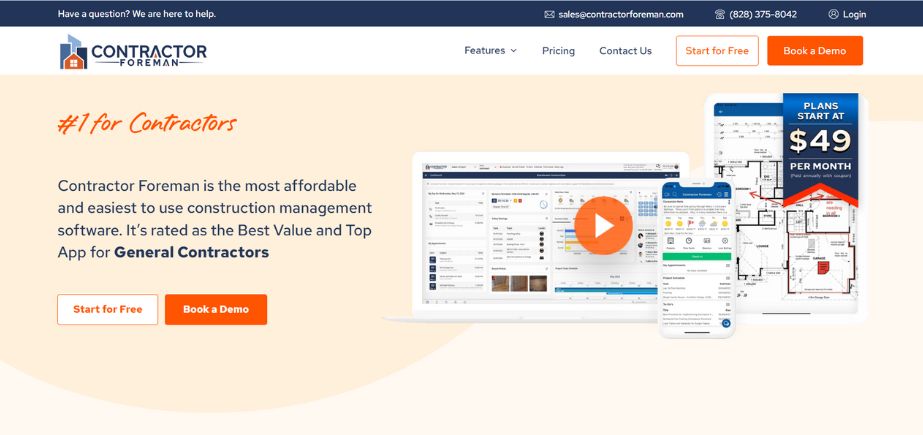
Rating: 4.8/5
Website: https://contractorforeman.com/
Best Use Cases: Comprehensive project management and team collaboration solutions
Contractor Foreman is one of the leading cloud management construction applications, solely designed to meet the demand of electrical contractors that require maximum business control. The powerful tool combines project scheduling, time tracking, document management, and communication of team communication into a single stream.
The platform is a specialist in operating various electrical projects at the same time when it comes to detailed oversight of labor costs, material, operations, and project schedules. Its simple dashboard will update contractors with the progress of the projects, employee productivity, etc., and the top-down approach further helps meet the standards of the electrical industry. The software is superior as it can give a real-time insight into every part of electrical contracting concerns, beginning with the preliminary estimate to project completion and final billing.
Key Features:
- Project scheduling tools
- Time tracking system
- Document management hub
- Real-time collaboration features
- Financial reporting dashboard
Pros:
- Comprehensive functionality coverage
- Intuitive user interface
- Excellent customer support
Cons:
- Higher learning curve
- Premium pricing structure
- Limited mobile customization
Pricing: Starting at $49/month
2. Housecall Pro

Rating: 4.7/5
Website: https://www.housecallpro.com/
Best Use Cases: Mobile-focused field service management and customer engagement
Housecall Pro has developed into a nationwide field service management software that is tailored distinctly to electrical contractors and those who value mobility and engaging their customers.
A remarkable mobile application that enables technicians to view job information, change the status of work, transaction process, and/or communicate directly with the customers even when they are in the field is the outstanding feature of the software. The entire process of service provision involving preliminary exchange with a client, job resolution, and collection of the payment will be streamlined via this platform as much as possible.
The system has automated scheduling that makes the process more efficient because the routes and appointment for technicians will be streamlined, and clients will be aware of this because of the transparency provided on the customer portal, which is another satisfaction boost.
The possibility to connect the Housecall Pro and other frequently used business tools is effective to make sure that the firm will present an exceptional service when the electrical contracting firm begins to experience a larger scale of operations.
Key Features:
- Mobile-first application design
- Automated scheduling system
- Payment processing integration
- Customer portal access
- Route optimization tools
Pros:
- Outstanding mobile experience
- Strong customer features
- Easy implementation process
Cons:
- Limited estimating capabilities
- Basic reporting functions
- Restricted customization options
Pricing: $59/mo
3. Autodesk Construction Cloud
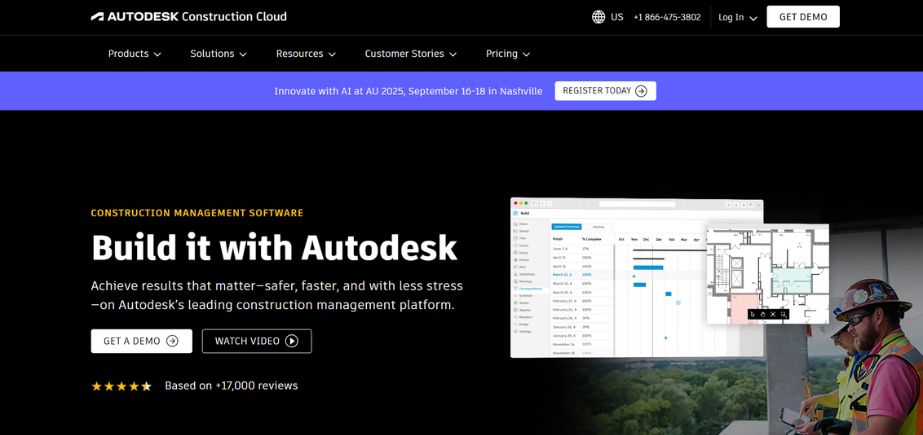
Rating: 4.6/5
Website: https://construction.autodesk.com/
Best Use Cases: Large-scale electrical projects requiring advanced design coordination
Autodesk Construction Cloud is the highest form of construction management technology that provides electrical contractors with advanced systems to integrate into sophisticated project coordination and design collaboration.
The highly integrated intelligent platform has absolute incorporation with the set of design software distributed by Autodesk, which offers exceptional capabilities to electrical contractors on large commercial or industrial initiatives. The BIM coordination capabilities of the system allow one to plan the electrical system with precision, identify clashes, and optimize the design of the project during the lifecycle.
The quality management tools guarantee the adherence to electrical codes and standards, whereas the document control abilities of the platform make sure all the stakeholders of the projects are operating on the correct version. The key features of the software are complex electrical works demanding elaborate coordination of works with the architects, engineers, and other trades.
Key Features:
- BIM coordination capabilities
- 3D modeling integration
- Quality management tools
- Document version control
- Multi-stakeholder collaboration
Pros:
- Industry-leading design integration
- Comprehensive project oversight
- Advanced collaboration features
Cons:
- Complex implementation process
- Expensive licensing costs
- Steep learning requirements
Pricing: Custom pricing
4. Jobber

Rating: 4.5/5
Website: https://www.getjobber.com/
Best Use Cases: Small to medium electrical contractors seeking versatile operations
Jobber has gained popularity as a flexible field service management tool that fits perfectly for the electrical contractor who has an electrical company that requires full business management, but is not too complex. This solution is well balanced between available functionality and usability as it provides powerful scheduling, invoicing, and customer management features via an easy-to-use interface.
The system is easily configured to meet the unique workflows and business needs of electrical contractors with the configurable functions of the software. The strong point proposed by Jobber is that the product it offers scales with any electrical contracting business, expanding its solution to suit the growth of companies when they start domestic services to possibly commercial work.
The platform offers tools of customer communication that enhance the delivery of the services, and an automatic billing and payment process ensure the effective operation of financial flows.
Key Features:
- Flexible scheduling system
- Customizable invoicing templates
- Customer management tools
- Mobile application access
- Automated payment processing
Pros:
- User-friendly interface design
- Highly customizable features
- Excellent scalability options
Cons:
- Limited advanced reporting
- Basic estimating tools
- No specialized electrical features
Pricing: $149/mo
5. Procore
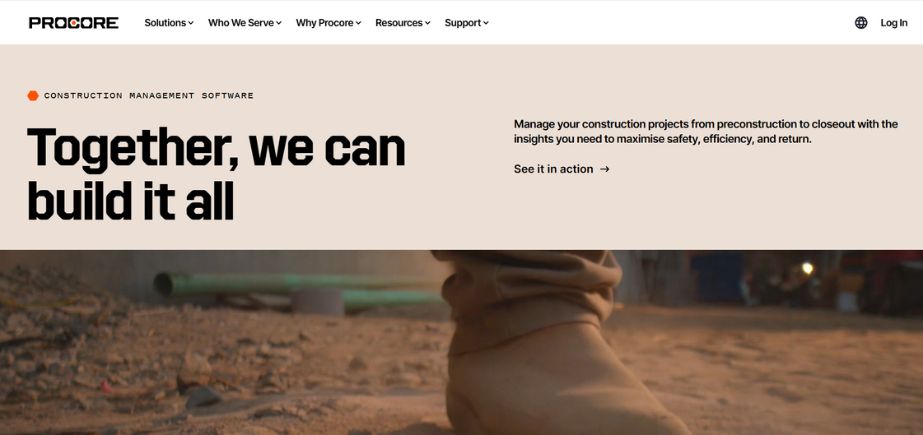
Rating: 4.4/5
Website: https://www.procore.com/
Best Use Cases: Enterprise-level electrical contractors managing multiple complex projects
Procore is the most popular and most used construction management platform in the construction industry, including features such as scale level tools to manage large projects and operations at complex levels as an electrical contractor. This effective system offers superior visibility of the project performance, financial monitoring, and quality assurance on a large-scale electrical contracting project in one go.
Its powerful project tracking functionality also allows the contractors to track project progress against budgets, schedules, and quality standards on a real-time basis. Financial management features of Procore also include an in-depth cost analysis, budget projections, and profitability information, which is vital to electrical contracting enterprises on a more significant scale.
The strong point of the software is that it is capable of managing the complexities of major electrical projects and offers analytical tools required to make strategic business decisions and to streamline operations.
Key Features:
- Enterprise project tracking
- Advanced financial management
- Quality control systems
- Performance analytics dashboard
- Multi-project oversight tools
Pros:
- Comprehensive enterprise features
- Strong financial tracking
- Excellent analytics capabilities
Cons:
- High implementation costs
- Complex user training
- Overkill for small contractors
Pricing: Custom pricing
6. ServiceTitan
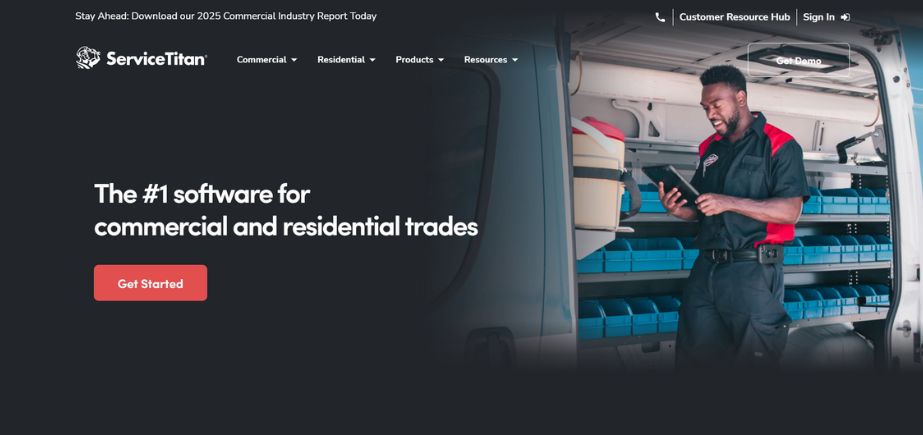
Rating: 4.3/5
Website: https://www.servicetitan.com/
Best Use Cases: Comprehensive business automation for residential electrical service companies
ServiceTitan has revolutionized the electrical contractor industry services by introducing an all in one business automation tool that is designed tailor made to the business needs of the residential services industries. It is a comprehensive process that brings all electrical contracting operations, including starting the contact with the customer, to job completion and subsequent maintenance relations.
The sophisticated scheduling and dispatching features of the platform maximize the productivity of the technicians with significant levels of customer satisfaction. Customer relationship management tools of ServiceTitan allow electrical contractors to create long-term relationships with clients due to maintenance contracts, reminders about services, and expert interactions.
The business intelligence capabilities of the software ensure that the electrical contractors achieve the greatest profitability by offering them an in-depth understanding of the effectiveness in operation, technician performance, and revenue optimization opportunities.
Key Features:
- Complete business automation
- Advanced scheduling algorithms
- Customer relationship management
- Business intelligence dashboard
- Maintenance agreement tracking
Pros:
- Comprehensive automation features
- Strong business analytics
- Excellent customer management
Cons:
- Expensive implementation costs
- Complex initial setup
- Overwhelming feature set
Pricing: Custom pricing
7. Stack
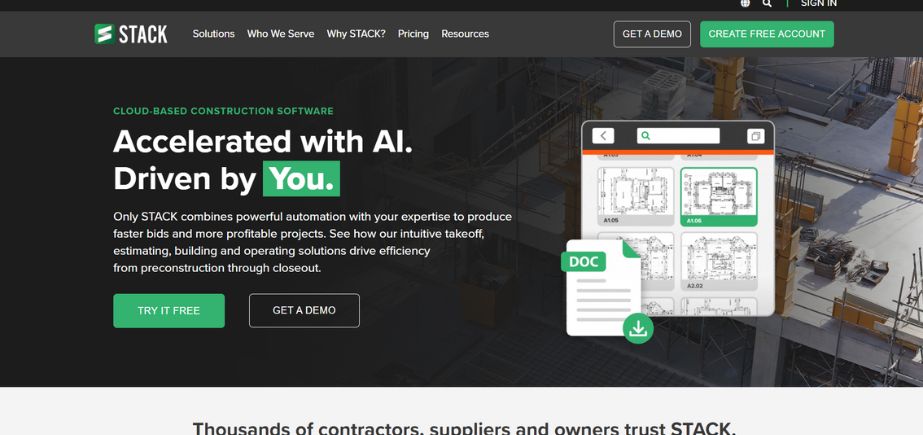
Rating: 4.2/5
Website: https://www.stackct.com/
Best Use Cases: Precise electrical project estimating and bid preparation
Stack has turned out to be the most ideal takeoff and estimating software among the electrical contractors who care about precision when bidding a project and its cost estimation. It is a cloud-based platform that focuses on digital plan takeoffs through which electrical contractors can prepare accurate material lists and labor estimates based on the blueprints of the projects.
The user-friendly program means that users can easily spot electrical components and measure the conduit runs, as well as calculate the requirements of the installation with sheer precision. To generate competitive and profitable offers, Stack has an accurate estimating engine containing up-to-date material costs, labor rates as well reimbursement rates within the industry.
The partnering features of the platform may be used in terms of the specialized part of bidding by enabling team members to see the estimates, alter them, and defend the version control throughout the bidding process that can make the process more accurate and effective in the win percentage of electrical contractors.
Key Features:
- Digital plan takeoffs
- Electrical component libraries
- Automated cost calculations
- Bid collaboration tools
- Material cost databases
Pros:
- Highly accurate estimating
- Intuitive takeoff interface
- Excellent bid generation
Cons:
- Limited project management
- Focused functionality scope
- Requires estimating expertise
Pricing: Custom pricing
8. FieldEdge
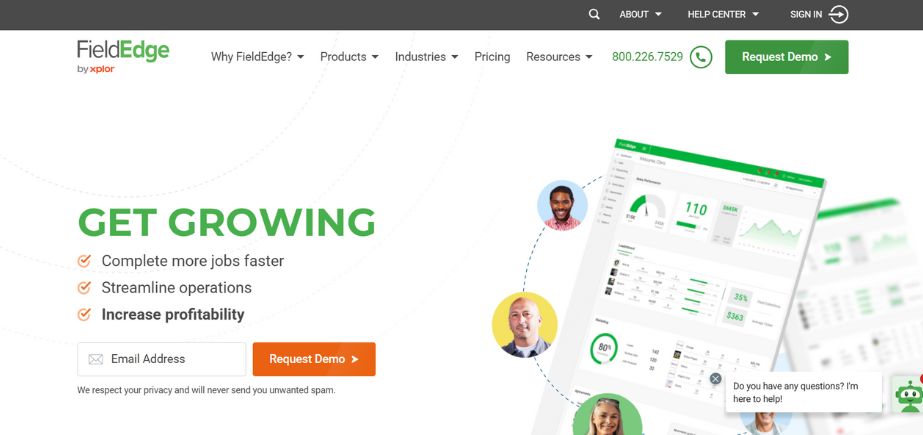
Rating: 4.1/5
Website: https://fieldedge.com/
Best Use Cases: Mobile-optimized field service operations and customer billing
FieldEdge has taken the perspective of a top-notch field service management system catering to electrical contractors who place a major emphasis on mobile applications and the simplification of operations in the field. Initially, this platform is the best at integrating the work of the office and field technicians since it has a solid mobile application that offers all the job information, real-time updates, and instant communication abilities.
Scheduling and dispatching functionalities within the software maximize the efficiency of technicians, as well as making sure the customer appointments are scheduled in the most efficient manner possible. The on-site billing and invoicing system by FieldEdge helps to increase customer satisfaction and increase cash flow.
Use of inventory management features within the platform allows electrical contractors to monitor the usage of materials as well as keep stock levels and ensure that the technicians have the needed materials to complete the job. FieldEdge fits well into the electrical contractor marketplace, mainly working in the residential and light commercial markets, in part because of this mobile-first strategy.
Key Features:
- Mobile-optimized interface design
- Real-time job tracking
- On-site payment processing
- Inventory management system
- Customer communication tools
Pros:
- Excellent mobile functionality
- Streamlined field operations
- Strong billing features
Cons:
- Limited estimating capabilities
- Basic reporting functions
- Narrow feature focus
Pricing: Custom pricing
9. Kickserv
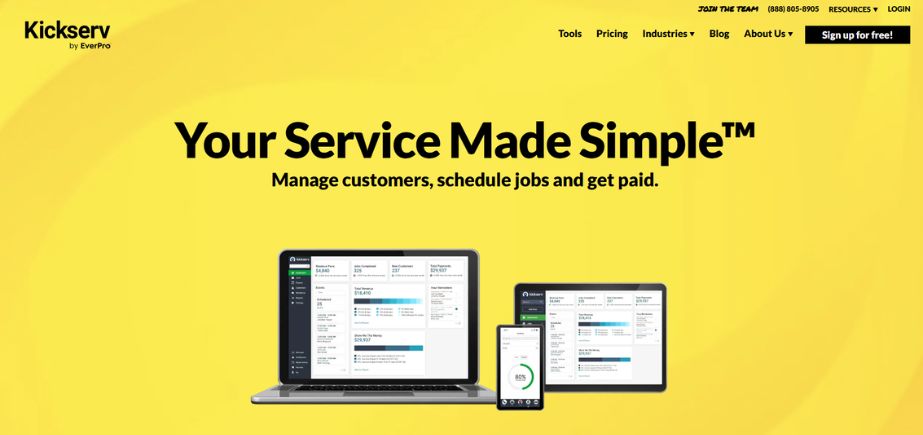
Rating: 4.0/5
Website: https://www.kickserv.com/
Best Use Cases: Simple scheduling and basic service management for contractors
Kickserv is an efficient electrical contractor field service management solution that aims to provide the simplest and least complicated field service management solution. This program concentrates on the fundamental business functions and processes, such as scheduling, dispatching, invoicing, as well as basic customer management in the form of a simple to learn program that necessitates minimal training.
Job tracking software functions give a better perspective of the activities of technicians and project progress, and communication software with the clients ensures strong affiliations between the firm and the clients by automatically updating clients via automated notifications and customer emails. The payment processing integration in Kickserv allows the contractor to process payments easily and have better cash flow.
The most powerful feature of the platform is its simplicity, which may be the best decision regarding the small electrical contractors who need only minimum of the business management tool, but not the complexity of the business management system used by the big enterprises.
Key Features:
- Simple scheduling interface
- Basic job tracking
- Client communication system
- Payment processing integration
- Straightforward invoicing tools
Pros:
- Very easy implementation
- Affordable pricing structure
- Minimal learning curve
Cons:
- Limited advanced features
- Basic reporting capabilities
- No specialized tools
Pricing: $19/mo
10. Podium
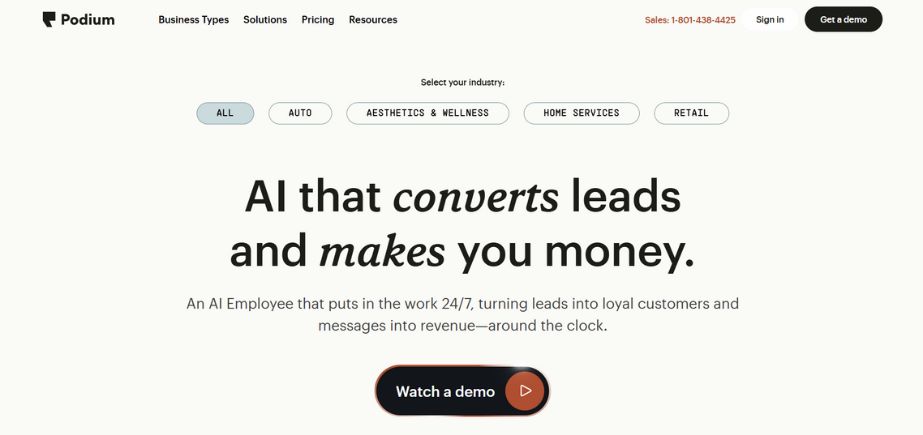
Rating: 3.9/5
Website: https://podium.com/
Best Use Cases: Customer communication and online reputation management focus
Podium is a specialized customer communications and reputation management company that all electric contractors consider whenever they want to improve their relationship with their clients and their online presence. Even though this platform concentrates more on messaging, review management, and webchat features, which assist the contractors in attracting new customers and having good relationships with existing clients.
The messaging tools used by the software can help contractors as they determine the right customer communications received through multiple interfaces get streamlined into a central channel, a nd make the contractors reply promptly and in a professional manner to customer queries. The review management offered by Podium assists electrical contractors in developing a positive online reputation by eliciting reviews left by satisfied customers as well as responding to negative customer reviews.
Podium is not a complete package but it performs exceptionally well in the customer facing electrical contracting functions which are primary in the business expansion and reputation in the highly competitive markets.
Key Features:
- Multi-channel messaging system
- Review management tools
- Webchat functionality
- Customer feedback collection
- Online reputation monitoring
Pros:
- Strong communication features
- Excellent reputation tools
- Easy customer engagement
Cons:
- Limited business management
- No project tracking
- Narrow functionality scope
Pricing: Custom pricing
How to Choose the Right Electrical Contractor Software
The selection of the software solution must consider the needs peculiar to your business, development and growth objectives, and particularities of your working process. The knowledge of such factors will direct you to the best platform to accompany your electrical contracting services.
- Budget: Consider both the initial implementation costs and the monthly subscription fee, ensure that the value props of the software are comparable to your financial capacity as well as the ROI in improved efficiency and new avenues of expansion of your venture.
- Features: examine which specific features are most relevant to your own operations and, where no compatibility exists, place a priority on tools that might address your most troublesome areas, such as conflict between schedules, accuracy in estimating, the capacity to communicate with customers or in tracking projects.
- Scalability: When selecting your solutions, consider your business growth requirements and select those that will support any expansion you have planned, such as increasing service territories, hiring additional technicians, or winning more complicated contracts within the commercial side of your business that will require more advanced management features.
- Integration: Ensure that the Electrical Contractor Software can integrate with the other business systems which could be accounting systems, supplier database, or customer relationship management systems in order to ensure that business continuity may be achieved.
- Support- investigate the skill level of customer support, training delivery and, post implementation support provided by the vendor of preferred software to understand how easily your preferred software could be implemented and whether the value could be sustained over time.
Conclusion
The Electrical Contractor Software Landscape has been having an ongoing growth with new solutions being presented to the existing electrical contracting businesses. Contractors have turned to technology today whether it is full scale project management systems or project estimating software to make a paradigm shift in their practices and generate a significant growth in business. The most important aspect is success through choice of software that will suit your needs as a small residential company or large commercial firm.
It can be observed that under a carefully assembled review of features, price, and scalability options, electrical contractors get to launch Electrical Contractor Software solutions that will aid in cutting down on operational labor, increasing customer satisfaction and actual treatment of profitability.
As an industry increasingly shifts toward digitalization, investment in the appropriate software platform is no longer a secondary injurious factor of the operations; however, rather, it becomes a competitive necessity moving on a path towards sustainable business sustainability.
Frequently Asked Questions
1: How much does Electrical Contractor Software usually cost?
Pricing is usually around the ballpark of 30-200+ per month per user, depending on the features and business size needs.
2: Are these software solutions compatible with current accounting systems that can be used?
Most current systems have the capability of integrating with well-known accounting software packages such as QuickBooks and Xero.
3: So, what is the normal duration of implementation of new contractor software?
It can be implemented in 2-8 weeks, depending on the complexity of the system and the business size requirements.
4: Are those online, offline-ready platforms that can be used by field technicians?
Lots of solutions feature offline mobile abilities without any need to synchronize manually when the internet connection is available again.
5: How do electrical contractors normally get training?
The large majority of vendors offer fully-fledged training packages that include online training courses as well as onsite implementation support programs.
